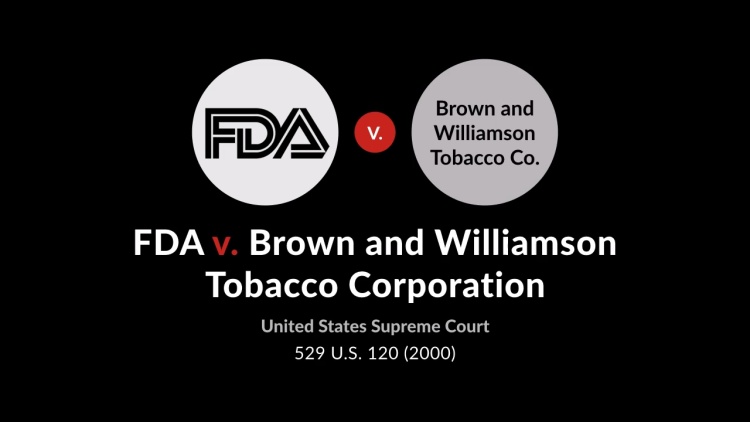Food and Drug Administration v. Brown & Williamson Tobacco Corp.
United States Supreme Court
529 U.S. 120, 120 S.Ct. 1291, 146 L.Ed.2d 121 (2000)

- Written by Eric Cervone, LLM
Facts
In 1964, the United States surgeon general reported that smoking was dangerous. The Food and Drug Administration (FDA) (defendant) claimed it lacked authority to regulate smoking. Consistent with this position, Congress enacted six laws directly regulating tobacco products that did not delegate authority to any agency and even occasionally specifically prohibited agency regulations on certain tobacco matters. In 1996, the FDA reversed its earlier position and interpreted the Food, Drug, and Cosmetic Act (the act) in a way that authorized the FDA to regulate tobacco products. However, if the act applied to tobacco, the act’s other provisions would require banning tobacco products completely. Instead of banning all tobacco products, the FDA issued rules regulating tobacco use in young people. Brown & Williamson Tobacco Corporation and other entities (plaintiffs) sued, challenging the FDA’s authority to issue the rules. The district court ruled that the act authorized the FDA to regulate tobacco products as customarily marketed. The Fourth Circuit reversed, ruling that Congress had not authorized the FDA to regulate tobacco products. The United States Supreme Court granted certiorari.
Rule of Law
Issue
Holding and Reasoning (O’Connor, J.)
Dissent (Breyer, J.)
What to do next…
Here's why 907,000 law students have relied on our case briefs:
- Written by law professors and practitioners, not other law students. 47,100 briefs, keyed to 996 casebooks. Top-notch customer support.
- The right amount of information, includes the facts, issues, rule of law, holding and reasoning, and any concurrences and dissents.
- Access in your classes, works on your mobile and tablet. Massive library of related video lessons and high quality multiple-choice questions.
- Easy to use, uniform format for every case brief. Written in plain English, not in legalese. Our briefs summarize and simplify; they don’t just repeat the court’s language.





